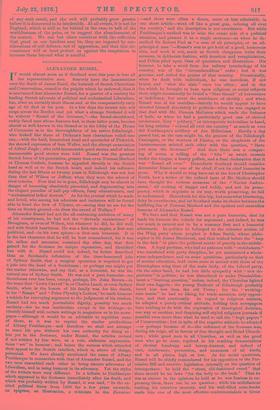THE GERMAN AND ENGLISH NAVY.
THE new number of the Edinburgh Review contains an article on the growth of the German Navy, which will be very profitable reading for Englishmen. The fact that a new maritime Power has arisen in Europe has as yet been scarcely realised in this country. Our Fleet is a very ancient element in our strength, whether for offence or defence, and the Fleets against which it has from time to time been em- ployed are of corresponding antiquity. Again, a fleet is naturally associated with the harbours in which it lies when at rest, and the popular knowledge of naval ports is, for the most part, limited to the Mediterranean and the Black Sea. It is difficult to remember that when next England is at war, she will have to reckon on the alliance, or the opposition, or the neutrality of a Power which, no longer ago than 1848, possessed one newly-built sailing corvette and two rowing gunboats. Since that time, the progress, first of the Prussian, and next of the German Navy, has been steady and rapid. The want of ships was brought keenly home to the Prussian people by the blockade of the German ports by Danish ships in the Sleswig-Holstein war, and by the autumn of 1849 the single corvette had grown into a force of 45 vessels, carrying 97 guns, and manned by 48 officers and 1,753 men. How modest a Navy this still constituted will be seen when we add that of these 45 vessels only three were propelled by sail or steam. The remaining 42 were merely rowing gunboats. During the years between 1849 and 1863, the Prussian Government kept the increase of the Navy constantly in view, and at the end of the latter year the 42 rowing gunboats had been diminished by two, while the single sailing-vessel had grown to eight, and the two steamers to 31. The necessity of a Navy for Prussia was first asserted in the Chamber by the Minister of War in 1865. Without it, he said, she could neither defend her coasts, nor protect German trade, nor maintain and extend her European influence. With the strong common-sense that has done so much to make Prussia great, General von Roon dismissed for the time the idea of making Prussia a maritime Power of the first rank. He only asked the means of making head, in case of necessity, against the secondary Powers of the Baltic and the North Sea. The Opposition in the Chamber steadily refused to grant the Government what they asked, but, in spite of their resistance, the Government went on adding to the Fleet, and immediately before the outbreak of the war with Austria, it consisted of 40 steamers, 8 sailing-vessels, and 36 rowing gunboats, forming a total of 84 vessels, carrying 490 guns, and manned by 154 officers and 1,693 men. After the war of 1866, all opposition to the will of the Government was at an end. Prussia became possessed of two ironclads, one originally laid down for the Turkish Government, the other constructed in France. In three years, these 2 ironclada had increased to 6, and by 1872 to 9. In 1873 the Imperial Government introduced a scheme for the construction of a Navy which should correspond with the marvellous development which the destinies of Prussia had undergone. The ironclad fleet was to consist of 8 frigates, 6 corvettes, 7 monitors, and 2 batteries. Of unarmoured ships, there were to be 20 corvettes, 6 despatch-vessels, 18 gunboats, and 28 torpedo-vessels. By last autumn, 6 out of the 8 frigates, 4 out of the 6 ironclad corvettes, and 10 out of the 20 unarmoured corvettes were ready for sea. They represent, says the Edinburgh Reviewer, an effective fleet more than equivalent to an equal number of vessels in the service of any other Power, because they have been built with all the recent improvements, instead of being, as so many English and French ships are, mere compromises between one type of vessel and another. The ' Kaiser' and the Deutschland,' which have been built in England from the designs of Mr. Reed, are equal to any ships in the British Navy ; indeed, we have only three ships, the ' Sultan,' the' Hercules,' and the' Monarch,' that can rival them. They are all armed with steel breech-loading rifled cannon. Of the two naval stations belonging to Germany, Kiel is the key of the Baltic, while upon the new arsenal of Wilhelmshaven, which gives the Empire a port outside the Baltic which is open all the year, eight millions sterling have been spent within the last few years. The weakest point in the German Navy is the system of recruiting. The Seewehr is composed mainly of conscripts from the seafaring population, who are exempt from service in the Army, but as no man is taken as a sailor unless he has been at sea for a year, as the inhabitants of the coast districts show a marked and increasing dislike of the Merchant Service, and as many of those who are liable to join the Fleet take service on board foreign merchant- men, great difficulties are experienced in providing the neces- sary recruits. The officers are carefully trained and highly paid.
How, it may be asked, does all this concern us? Among other things, it may console us for the enormous increase which our own Naval Estimates have shown during the period in which the German Fleet has been growing up. By a con- venient coincidence, this article in the Edinburgh Review ap- pears at the same moment as an article in the Quarterly Review upon the cost of the English Navy. This latter paper contains a well-arranged summary of the heads under which this increase is distributed, so that the reader can see precisely what it is that the country gets in return for the money that it so freely spends. The Reviewer takes the Estimates of 1835, and compares them in detail with the Estimates of 1876. In the former year they amounted to about two and a half millions, in the present year they amount to about nine and a half millions. The difference between the votes for wages and food in the two selected years nearly equals the total cost of the Navy in 1835, and the increase in the vote for Ship- building is not very much less. Yet it is not too much to say that this vast increase of expenditure would have been equally necessary had there been no German Fleet in existence. Other Powers have been adding ship to ship as well as we, and without including the new Power with which we may one day have to reckon, there has been abundant need for the development that the English Fleet has undergone. It is, something, however, to know that the appearance of a new element in the Naval combination of Europe finds us with little needing to be done, except to prepare for the farther outlay that such a phenomenon imposes upon us. It would be the merest folly to argue as though the growth of a German Fleet could be anything else than a subject of serious reflection to every Englishman. A great Power like Germany does not like to be the inferior of any one in matters in which it has once busied itself. There was a time when Prussia could talk, and in all probability, talk honestly, of aiming only at such a Navy as might enable her to meet fleets of the second class. There is no such limit to her ambition now. At each stage of her Fleet's growth—first, when it became the fleet of the North-German, and next, when it became the fleet of the German Empire—the conceptions of the Govern- ment have grown larger. Even the addition of the existing German Fleet to the Navies of the world involves a correspond- ing addition to the burdens of the English taxpayer, and there is no security that the existing German Fleet is more than a fractional part of the German Fleet as it will be known in the future. The ambition which has made Germany the first military Power in Europe will hardly rest content with a low place in the list of maritime Powers. It is no longer possible for England to be content with the standard of naval superiority that was once sufficient for her. When there were virtu- ally but three fleets to be taken into account, the English, the French, and the Russian, we had only to take care that we were a match for the two last, supposing them to be united against us, and our position was secure. The rise, first, of the Italian and now of the German navies has deprived this calcu- lation of all its value. There are now four Powers from which an enemy's fleet might conceivably be made up, and even then we have not included subordinate fleets, such as those of Spain and Turkey, which might be arrayed against us, under the domination of some hostile in- fluence stronger than themselves. We see no probability, therefore, that the increase in the Navy Estimates, great as it undoubtedly is, will prove to be anything more than the pre- lude to a still greater increase in the future. Whether the burdens which one Power after another has taken on its shoulders may in the end prove greater than can be borne is another question. Universal armament may, in the end, bring about universal disarmament. But there are no present signs
of any such result, and the evil will probably grow greater before it is discovered to be intolerable. At all events, it is not for England, which is still so far behind in the race, to talk of the worthlessness of the prize, or to suggest the abandonment of the contest. We can but cheer ourselves with the reflection that great as our burdens may be, they are imposed by con- siderations of self-defence, not of aggression, and that this cir- cumstance will at least protect us against the temptation to increase them beyond what is needful.































 Previous page
Previous page